Socialization during early puppyhood is considered critical for shaping future behavior, but its specific effects vary by breed and context. A 2010 study published in the Journal of Veterinary Medical Science investigated how a structured socialization program influenced the behavioral reactivity of Jindo dogs, a Korean breed known for independence and loyalty.
The research team, led by Y. K. Kim, divided 12 Jindo puppies into two groups at seven weeks of age. One group received a socialization program from weeks 7 to 13, involving exposure to humans, dogs, and novel stimuli. The other group was raised in a semi-isolated environment without this structured exposure. Both groups were later adopted as family pets and assessed through behavioral tests conducted at 7, 9, 11, 13, and 60 weeks of age.
Principal component analysis of the test data identified three main behavioral factors: social reactivity toward humans and dogs, playful reactivity toward novel stimuli and dogs, and fearful reactivity toward social stimuli. Results revealed that at the ninth week of age, the socialized puppies showed significantly higher playful reactivity toward novel objects and another dog compared to the non-socialized group. However, socialization did not significantly affect social reactivity or fearful reactivity across the test sessions.
These findings suggest that early structured socialization in Jindo puppies enhances playful behavior and adaptability in novel contexts. While it may not strongly alter fear responses or general sociability, it supports developmental processes that help puppies engage more positively with their environment. The study underscores the importance of targeted early-life experiences in shaping canine behavior.
Source: Kim, Y. K., Lee, S.-S., Oh, S., Kim, J. S., Suh, E., Oupt, K. A., Lee, H.-Y., Lee, H., & Yeon, S., Journal of Veterinary Medical Science, April 1, 2010. https://doi.org/10.1292/jvms.09-0413










